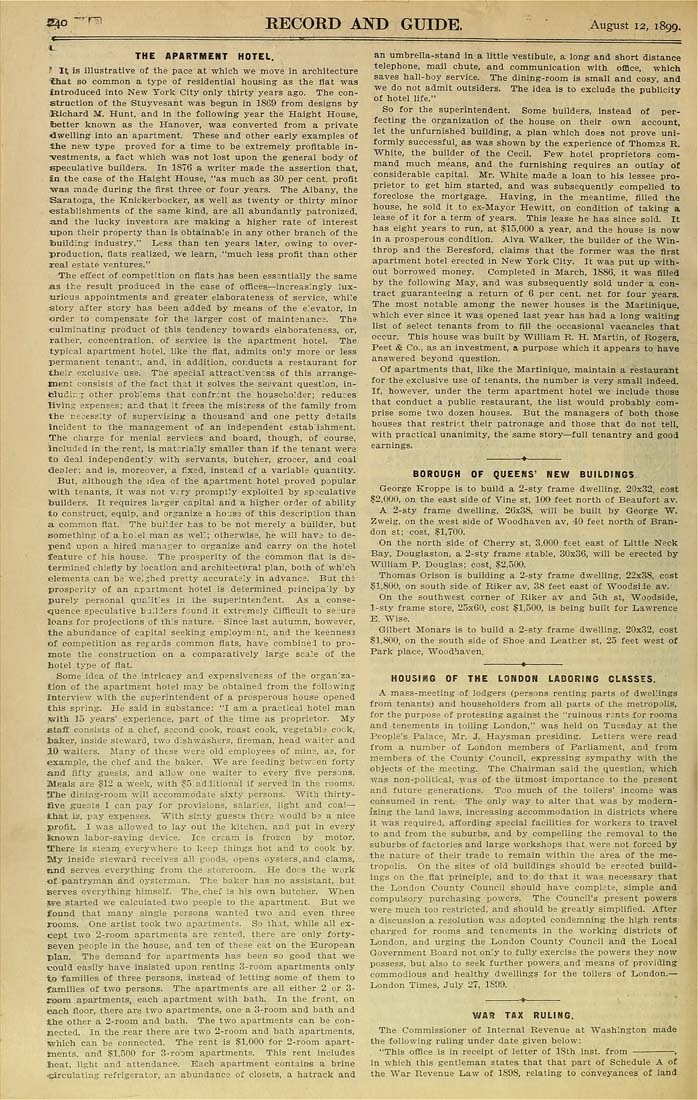Columbia University Libraries Digital Collections: The Real Estate Record
Use your browser's Print function to print these pages.
Real estate record and builders' guide: v. 64, no. 1639: August 12, 1899

Text version:
Please note: this text may be incomplete. For more information about this OCR, view About OCR text.
S40 'm RECORD ÂKD GUIDE, August 12, 1899. THE APARTMENT HOTEL. !" It is îllustrative of the pace at which we move in architecture "ïhat so common a type of residential housing as the flat was introduced into New York City only thirty years ago, The con¬ struction of the 'Stuyvesant was begun in 1S69 from designs by Richard M. Hunt, and In the following year the Haight House, better known as the Hanover, was converted from a private dwelling into an apartment. Thèse and other early examples of the new type proved for a time to be extremely profitable in- ■vestments, a fact which was not lost upon the gênerai body of spéculative builders. In 1ST6 a writer made the assertion that, Iq the case of the Haight House, "as much as 30 per cent, profit ■was made during the first three or four years. The Albany, the Saratoga, the Knickerbocker. as well as twenty or thirty minor establishments of the same kind, are all abundantly patronized, and the lucky investors are making a higher rate of interest ïipon their property than is obtainable in any other branch of the fcuild:ng industry," Less than ten years later, owing to over- production, flats realized, we learn, "much less proflt than other real estate ventures." The ef£ect of compétition on flats has been esssntially the same B.S the resuit produced in the case of officesr-increasingly lux- urious appointments and greater elaborateness of service, while story after story has been added by means of the elevator, in order to compensate for the larger cost of maintenancs. The culminating product of this tendency towards elaborateness, or, rather, concentration, of service is the apartment hotel. The typical apartment hotel. like the flat, admits on'.y more or less permanent tenant", and. in addition, coi:ducts a restaurant for tlieir exclusive use, The spécial attractiveness of tbis arrange- Oaent consists of the fact th3.t it solves the servant question, in- fcludir.3 other problems that confrcnt lhe householder; reduces living e;:penses: ar.d that it frees the mistress of the family from the necessity of supervising a thousand and one petty détails Incident to the management of an independent estab'ishment. The charge for menial services and board, though, of course, ïncluded in the ren', is materially smaller than if the tenant were to deai independently with servants, butcher, grocer, and coal dealer; and is, moreover, a f.xed, instead cf a variable quantity. But, although the idea of the apartment hotel proved popular with tenants, it was not v;ry promptly exploited by spéculative builders. It requires la'-ger capital and a higher order of ability to construct. equip. and or^anize a house of this description than a common flat. The builder has to be not merely a builder. but something of a holel man as well; otherwise, he will havï to dé¬ pend upon a hired ma',i,ic;er to organize and carry on the hotel feature cf his house. The prosperity of the common flat is de¬ termined chiefly by location and architectural plan, both of which éléments can be weljhed pretty accuratsly in advance. But thi prosperity of an apartment hotel is determined piincipally by purely personal qualif.es in the superintendent. As a conse-